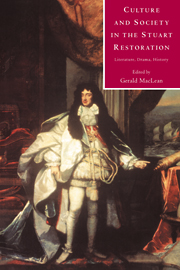Book contents
- Frontmatter
- Contents
- Notes on contributors
- Acknowledgments
- Abbreviations and note on the text
- INTRODUCTION
- PART I DRAMA AND POLITICS
- 2 The quest for consensus: the Lord Mayor's Day Shows in the 1670s
- 3 Politics and the Restoration masque: the case of Dido and Aeneas
- 4 Factionary politics: John Crowne's Henry VI
- PART II AUTHORSHIP AND AUTHORITY
- PART III WOMEN AND WRITING
- PART IV EMPIRE AND AFTERMATHS
- Index
3 - Politics and the Restoration masque: the case of Dido and Aeneas
Published online by Cambridge University Press: 20 August 2009
- Frontmatter
- Contents
- Notes on contributors
- Acknowledgments
- Abbreviations and note on the text
- INTRODUCTION
- PART I DRAMA AND POLITICS
- 2 The quest for consensus: the Lord Mayor's Day Shows in the 1670s
- 3 Politics and the Restoration masque: the case of Dido and Aeneas
- 4 Factionary politics: John Crowne's Henry VI
- PART II AUTHORSHIP AND AUTHORITY
- PART III WOMEN AND WRITING
- PART IV EMPIRE AND AFTERMATHS
- Index
Summary
Our understanding of the relationship between politics and literature in early-modern England has increased significantly in recent years, and we are now seeing the beginnings of a full investigation into the ways in which much of the literature – particularly the drama – of Restoration England was explicitly political, both in its conception and in its rhetoric. Yet despite this growing interest in the political nature of Restoration literature, little attention has been devoted to the politics of the Restoration masque. As we now know from the work of Kevin Sharpe, Martin Butler, and others, the masque as it existed before the outbreak of the Civil War was a highly politicized form, in which these ostensibly most panegyrical of dramatic texts commonly engaged in political controversy, sometimes offering criticism of royal policy. Not surprisingly, the same holds true of Restoration masques which, like their Jacobean and Caroline counterparts, were addressed primarily to members of the political and social elite, and sought to advise that audience about important contemporary issues. Similarly, the power and influence wielded by those who attended masques at both the pre- and post-Civil War English Courts dictated that the author adopt an aesthetics of dissimulation in order to avoid running foul of the censor or, which would be worse, losing Court patronage.
Yet during the Restoration, the strategies by which political messages were both concealed from and revealed to their audience became far more elaborate and complex than in earlier reigns.
- Type
- Chapter
- Information
- Culture and Society in the Stuart RestorationLiterature, Drama, History, pp. 52 - 69Publisher: Cambridge University PressPrint publication year: 1995



